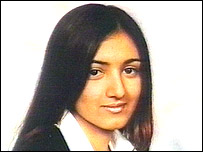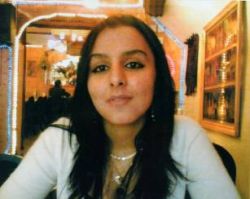Related Research Articles

Murder is the unlawful killing of another human without justification or valid excuse, especially the unlawful killing of another human with malice aforethought. This state of mind may, depending upon the jurisdiction, distinguish murder from other forms of unlawful homicide, such as manslaughter. Manslaughter is killing committed in the absence of malice, brought about by reasonable provocation, or diminished capacity. Involuntary manslaughter, where it is recognized, is a killing that lacks all but the most attenuated guilty intent, recklessness.

Deeyah Khan is a Norwegian documentary film director and human rights activist of Pashtun descent. Deeyah is a two-time Emmy Award winner, two time Peabody Award winner, a BAFTA winner and has received the Royal Television Society award for Best Factual Director. She has made seven documentaries to date, all have been shown on ITV in the UK as part of its Exposure series.

Hatun "Aynur" Sürücü was a Kurdish-Turkish woman living in Germany whose family was originally from Erzurum, Turkey. She was murdered at the age of 23 in Berlin, by her youngest brother, in an honor killing and sororicide. Sürücü had divorced the cousin she was forced to marry at the age of 16, and was reportedly dating a German man. Her murder inflamed a public debate over forced marriage in Muslim families.

Shafilea Iftikhar Ahmed was a British-Pakistani girl who was murdered by her parents in a suspected honour killing at the age of 17, due to their belief that she had become too Westernised.
Nāmūs is an Arabic word describing an ethical category in Middle Eastern patriarchal character. Often literally translated as "virtue", it is now more popularly used in a strong gender-specific context of relations within a family described in terms of honor, attention, respect/respectability, and modesty.
An honor killing, honour killing, or shame killing is the murder of an individual, either an outsider or a member of a family, by someone seeking to protect what they see as the dignity and honor of themselves or their family. Honor killings are often connected to religion, caste, and other forms of hierarchical social stratification, or to sexuality. Most often, it involves the murder of a woman or girl by male family members, due to the perpetrators' belief that the victim has brought dishonor or shame upon the family name, reputation or prestige. Honor killings are believed to have originated from tribal customs. They are prevalent in various parts of the world, as well as in immigrant communities in countries which do not otherwise have societal norms that encourage honor killings. Honor killings are often associated with rural and tribal areas, but they occur in urban areas as well.

Crime in Turkey is combated by the Turkish police and other agencies. Since the 1990s, overall crime in Turkey rose until its peak in 2014. As of 2014, Turkey has seen a 400% rise in crimes, but has steadily declined since then. In 1994, the number of arrested prisoners was recorded as 38,931; 20 years later, as of the beginning of October 2014, the number of prisoners has reached 152,335. According to the data provided by the Ministry of Justice, terrorism and homicide rate has been decreasing year by year after 2014 in Turkey and terrorism is almost never seen.

Banaz Mahmod was a 20-year-old Iraqi Kurdish woman who lived in Mitcham, South London, England. She was murdered on the orders of her family in a so-called honour killing because she ended a violent and abusive forced marriage and started a relationship with someone of her own choosing. Her father, uncle and three cousins were later convicted of her murder.
Honour killings in Pakistan are known locally as karo-kari. According to the Human Rights Commission of Pakistan, over 470 cases of honor killings were reported in Pakistan 2021. But human rights defenders estimate that around 1,000 women are killed in the name of honor every year. An honour killing is the homicide of a member of a family or social group by other members, due to the belief the victim has brought dishonour upon the family or community. The death of the victim is viewed as a way to restore the reputation and honour of the family.
The Shafia family murders took place on June 30, 2009, in Kingston, Ontario, Canada. Shafia sisters Zainab, 19, Sahar, 17, and Geeti, 13, along with their father's wife Rona Muhammad Omar, 52, were found dead inside a car that was discovered underwater in front of the northernmost Kingston Mills lock of the Rideau Canal. Zainab, Sahar, and Geeti were daughters of Mohammad Shafia, 58, and his wife, Tooba Mohammad Yahya, 41. The couple also had a son, Hamed, 20, and three other children. Rona, who was herself infertile, was the first wife of Mohammad Shafia in their polygamous household.

The Vancouver Canucks Ring of Honour is a collection of permanent in-arena displays, used as a means to celebrate and acknowledge players who made a lasting impact on the franchise. Along with the permanent display each inductee is given a night of recognition, during the unveiling of their display, that includes a video tribute and an on-ice presentation. Established as part of the Canucks' 40th National Hockey League's (NHL) season celebration in 2010–11, four members were inducted in the first year. Members are selected by an advisory committee that includes former players, broadcasters, and staff members.
Collective Opposed to Police Brutality (C.O.B.P), also known as Collectif Opposé à la Brutalité Policière, is an autonomous group founded in Montreal in 1995. This organization consists of victims, witnesses, representatives of ethnic communities, marginalized youth, small political groups, the homeless, sex workers, LGBTQ+, drug users, and others who have questions about police authority.

Banaz: A Love Story is a 2012 documentary film directed and produced by Deeyah Khan. The film chronicles the life and death of Banaz Mahmod, a young British-Iraqi woman of Kurdish origin killed in 2006 in South London on the orders of her family in a so-called honour killing. The film received its UK premiere at the Raindance Film Festival in London September 2012.
Rape in Egypt is a criminal offense with penalties ranging from 15 to 25 year and a lifetime sentence if the rape included abduction. Marital rape is legal. By 2008, the U.N. quoted Egypt's Interior Ministry's figure that 20,000 rapes take place every year, although according to the activist Engy Ghozlan (ECWR), rapes are 10 times higher than the stats given by Interior Ministry, making it 200,000 per year. Mona Eltahawy has also noted the same figure (200,000), and added that this was before the revolution.

Violence against women in India refers to physical or sexual violence committed against a woman, typically by a man. Common forms of violence against women in India include acts such as domestic abuse, sexual assault, and murder. In order to be considered violence against women, the act must be committed solely because the victim is female. Most typically, these acts are committed by men as a result of the long-standing gender inequalities present in the country.

Iqra Khalid is a Canadian politician who was elected to represent the riding of Mississauga—Erin Mills in the House of Commons of Canada in the 2015 federal election.

A Girl in the River: The Price of Forgiveness is a 2015 documentary film directed by Sharmeen Obaid-Chinoy about honor killings in Pakistan. The film is produced by Tina Brown and Sheila Nevins in collaboration with HBO Documentary Films. A Girl in the River was edited by Geof Bartz, A.C.E. The documentary was well received by critics and earned widespread critical acclaim. A Girl in the River was shortlisted with ten other documentaries from 74 entries submitted to 88th Academy Awards in Documentary Short Subject category, which it won.
References
- ↑ Shubhi Tandon (2011-06-15). "New site brings dignity to victims of honor-violence". womennewsnetwork.net. Retrieved 2012-02-07.
- ↑ "Singer speaks out against Honour Killings". theasiantoday.com. 2011-05-20. Archived from the original on 2013-02-03. Retrieved 2012-02-07.